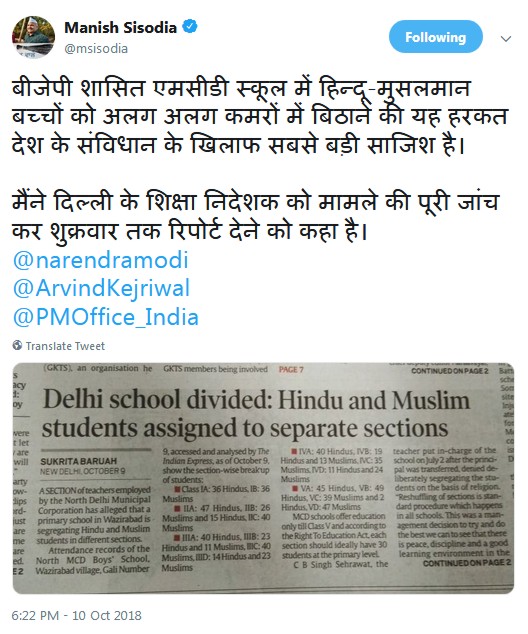A primary school in Delhi with students as young as five and 10 was segregating classrooms on the basis of religion and when the teachers protested, they were told to focus on their jobs.

Representaion Image
New Delhi: Parents and teachers at a primary school in Delhi were mortified when they learned that children as young as 5 to 10 years old were being segregated on the basis of religion in their classrooms.
In a report by Indian Express, it was found that the school had placed Hindu and Muslim students in different sections.
“A section of teachers employed by the North Delhi Municipal Corporation has alleged that a primary school in Wazirabad is segregating Hindu and Muslim students in different sections. Attendance records of the North MCD Boys’ School, Wazirabad village, Gali Number 9, accessed and analysed by The Indian Express, as of October 9, show the section-wise break up of students,” said the report.
It calculated the numbers of Hindu and Muslim students in every section from Class I to Class V and found out that every class had been divided on the basis of religion.
C B Singh Sehrawat, the teacher put in charge of the school on July 2 after the principal was transferred is being seen prima facie as the person who initiated this move. “He initiated these changes and teachers were not consulted in the matter. When some teachers tried to bring it up with him, he responded with aggression and told them that it was none of their concern and that they should do their assigned jobs,” a source told Indian Express.
Parents of students studying at the school told The Indian Express that they were not aware of this reorganisation. A mother of a Class IV student denied that such segregation was taking place until her son said, “There are no Hindu boys in my class. We were together until a few months back. A good friend of mine is no longer in the same classroom.”
The mother of a Class I student, who was not aware of this development, said, “This is extremely wrong, if true. We believe all children are equal. What is going to happen if they are treated like this at the school level itself? This is very disturbing.”
Taking note of the report, Delhi Education Minister Manish Sisodia said a probe has been ordered and sought a report by December 12. Sisodia further targeted the BJP-governed MCD that operates the school and said that such actions violate the Constitution.

The teacher-in-charge was suspended on Wednesday and was found guilty following preliminary investigations. Penalty proceedings have been initiated against him according to another report by The India Express.
The Delhi Commission for Protection of Child Rights sent a notice to the Director of education in North Delhi Municipal Corporation and head of the school seeking immediate dissolution of such grouping, saying it was against constitutional values, the commission sought an explanation from the director within two days.
Fr. Frazer Mascarenhas, the former Principal of St. Xavier’s College, Mumbai spoke to Sabrang India about the importance of integration in classrooms.
“Inclusion is important when educating children. Our institutes have pursued the inclusion of all children regardless of their backgrounds and have made a point to include disabled kids too. When such kids learn together, it helps everyone to accept all types of people. It is a well-established principle,” he said.
“In India and around the world, so many different religious groups live and work together. There is no segregation there. Having segregation in education doesn’t make sense and goes against all the fundamental principles of education. Segregation provokes conflict at the later stage. Since no understanding has been mutually reached among the groups in their formative years. When you learn amongst a mixed bunch, there is a chance of interactions and learning about people and what is important to them, their values and beliefs. Everybody comes back enriched with this experience,” he added.
He said that no institute should become an exclusive zone or a ghetto. “Even the Supreme Court of India and the constitution gives only 50% reservation rights to minority institutions as the general populace should get a chance to integrate. No institution should become an exclusive zone or a ghetto. Such segregations are dangerous for society. Such insulations propagate stereotypes and integration becomes difficult after they graduate and become adults. We are already seeing how history is being rewritten and changed and religious groups are demonized. We should know and read our constitution which tells us that India is a secular, democratic, socialist republic. Integration is an important priority,” he said.
Speaking to Sabrang India, Avnita Bir, director-principal, R.N Podar School, Mumbai, said that schools need to represent the society the children live in. “We cannot represent just one segment of the society. We need to have a more mature outlook. The students shouldn’t find a dichotomy in what they see in school and I the real world. The school should be a parallel which the students can refer to when they step outside. The schools must reflect the world and the environment they inhabit. Integration is important for children as these are their formative years where their outlook is being shaped, exposed to the world. This is where they will learn to develop empathy and compassion,” she said.